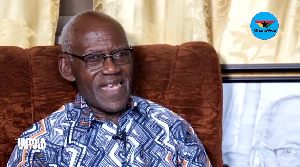- Home - News
- TWI News | TV
- Polls
- Year In Review
- News Archive
- Crime & Punishment
- Politics
- Regional
- Editorial
- Health
- Ghanaians Abroad
- Tabloid
- Africa
- Religion
- Election 2020
- Coronavirus
- News Videos | TV
- Photo Archives
- News Headlines
- Press Release
Diasporia News of Monday, 21 May 2007
Source: Ulaanbaatar
Counterfeit Hospitality: Stuck in Mongolia
Two men from Ghana have found Mongolia’s system of justice be relaxed at best. The men, who we will call John and Obo, were caught red-handed last month attempting to produce counterfeit money in the room of the guesthouse where they were staying. Despite their apparent criminal activities, the men were never charged or arrested and instead were deported to their home country via Japan. This is excellent news for any would-be counterfeiters, whose only punishment it seems is a free ride home.
The story began in early April 2007 when a worker at the guesthouse smelled toxins emanating from one of the rooms. Upon entering the room the worker found chemicals in open jars and stacks of blank papers that were size and texture of US dollars. The guesthouse reported the discovery to the police who came to investigate and wisely determined that a counterfeiting operation was underway. As the guesthouse explained to the police, the two men occupying the room were citizens of Ghana.
The police responded to the incident by confiscating the counterfeiting material and ordering the Ghanans to remain in the guesthouse while the incident was under investigation. When the guesthouse management asked why the men had not been arrested and taken to prison, the police explained that they had no resources to accommodate foreign men in the Ulaanbaatar prison. The police explained to the guesthouse owner that for the safety of the Africans they would remain in the hostel while the investigation proceeded, indicating that such an investigation would last no longer than three or four days.
After one month the Africans were still in the guesthouse, being housed at the expense of the management. Repeated requests to the police to have the Africans removed from the guesthouse failed. Police warned the guesthouse management that should it forcibly remove the Africans it would face criminal charges. Meanwhile, the Africans made life difficult for the hotel management; they broke windows and threatened the management and staff with violence.
After one month the Africans were finally deported at their own expense. This is not the first time Mongolia’s Ministry of Internal Affair would take such action. In 1998, two men from Cameroon, having already been found guilty of counterfeiting money, were deported to their home country. Mongolia’s reaction to such incidents has not always been swift. In 2000, a man from Nigeria was arrested in Zamyn Uud for carrying a false passport. The man was held for 18 months before authorities were able to deport him to his own country.
The message that the Mongolian government is sending to foreign criminals is clear: if they are ever caught the worst punishment they will receive is deportation. Once this message is out it will only serve to invite more crime to Mongolia. As for the guesthouse, the police failed to compensate it for having housed the Africans. This also sends a clear signal to the citizens of Ulaanbaatar that playing the roll of good citizen will be of no particular benefit. And those are the hard facts of Mongolian justice.











